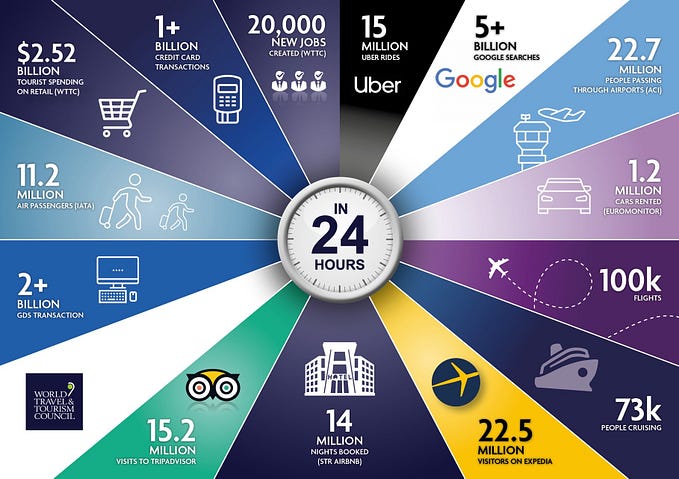What you didn’t know about tourism in Africa
Last year, Africa’s Travel & Tourism sector grew at a faster rate than any other global region, and at double the pace of the global economy. The sector also provided quadruple the number of jobs to African people than the banking sector did, employing 22.8 million people across the region. Tourism spend is also remarkably strong in Africa, with the sector representing 9.7% of all regional exports.

To mark these accomplishments and discuss what must now happen to ensure future growth, the World Travel & Tourism Council (WTTC) hosted its first event on African soil last week with its Africa Leaders Forum in Stellenbosch, South Africa. Here are some of the most thought-provoking takeaways from the event.
1. Over 30 million new jobs are set to be generated by Travel & Tourism by 2028.
If African countries implement visa reforms to better facilitate travel, work to achieve greater airline connectivity, and execute plans for growth, then WTTC estimates that in the next 10 years between 30 and 45 million jobs can be created in the region by the Travel & Tourism sector by 2028. South African President Cyril Ramaphosa has pledged that in his country alone, jobs in the travel sector are planned to double from 700,000 to 1.4 million.
2. Only 1% of all Chinese outbound tourists go to Africa.
Around 130 million Chinese people travel overseas each year and only 1% of them visit Africa. This large and growing market presents a huge opportunity for the continent. Relaxing visa restrictions has proven to increase visitors from specific markets, and countries such as Morocco, Tunisia, Angola and Ethiopia have already seen marked increases in Chinese visitors following visa facilitation measures.
3. Three of the five main air transport hubs for Africa are based outside of the continent.
The region faces a huge connectivity challenge with travellers frequently having to use an airport hub based outside of Africa when travelling across the continent. Three of the main air hubs for people visiting Africa are based in London, Paris and Dubai.

So, to fly from Cairo, Egypt, to Luanda, Angola, for example, we currently have to leave African air space and travel via Paris, doubling the total distance of the trip. Nevertheless, Addis Ababa is emerging as the regional hub and will overtake Dubai International Airport in terms of transfers from long-haul passengers to Sub-Saharan Africa in 2018, elevating it as a key regional hub and helping to centralise transfers within the continent.
4. The key to Africa’s future is Africa.
Speaking at the Africa Leaders Forum, Sisa Ntshona, CEO, South African Tourism stressed the need to include African citizens not only in the employment and service delivery of tourism, but in its consumption. He expressed that Africans should not be limited to the roles of driver, bartender and housekeeper, but instead become participants and beneficiaries of tourism. Likewise, Velma Corcoran of Airbnb talked to the importance of African storytelling by asking “How can we expect someone to be a host if they’ve never been a guest?”
5. The misrepresentation of Africa hurts countries’ economies.
H.E. Derek Hanekom, Minister of Tourism, South Africa highlighted that the epicentre of this decade’s Ebola crisis was closer in distance to the UK than it was to South Africa, and yet, the entire continent of Africa became synonymous with the outbreak and thus suffered a decline in tourism activity. Similarly, on the issue of water, the ‘Day Zero’ campaign by the South African government that was produced in order to change the consumption behaviours of residents became a sensational topic of discussion across the globe, eliciting panic and thus having a detrimental effect on South African tourism numbers in 2017/2018.
6. Cape Town represents 25% of tourism activity in South Africa.
The vibrant port city located in the Western Cape is a hive of travel activity, with tourist receipts totalling $2.3 billion and 170,000 locals working in the sector. In such a diverse region, other cities and resorts are now on the rise, which will allow for a more even geographical spread of tourists (and their dollars) across the country. Considering the 15-20% drop in tourist arrivals over the last year following the Cape Town drought, a greater dispersal of tourists around the country would make South Africa more resilient to such crises.

7. Cape Town is a ‘water wise’ city, cutting consumption by 60% in three years.
In managing water scarcity in this way, Cape Town has achieved a feat that no other city has matched. Such measurable success thus marks Cape Town as a ‘water wise’ city, according to Tim Harris, CEO, Wesgro. Madhu Rajesh of the International Tourism Partnership (ITP) shared best practice case studies from partners Hilton and Radisson who have each launched initiatives around laundry practices, with Radisson Hotels saving 58 million litres of water by encouraging guests to re-use their towels.
8. 80% of African Travel & Tourism workforce are women.
Women also comprise two-thirds of global travellers. Despite this strong representation both as consumers and workers, the type of jobs that women occupy in the sector are not necessarily the highest skilled. A glass ceiling persists whereby only 5% of senior management roles are currently filled by women, leading to an over-representation in non-management positions.
9. Wildlife is worth more alive than dead.
Panellists at the Forum discussed the value of African wildlife, with Paul Zille, CEO, Tourism Conservation Fund, arguing that SMEs should be built into supply chains of wildlife-based tourism, thereby giving communities a commercial incentive to protect animals as well as a moral one. Sisa Ntshona concluded that, “when people are included they protect; when people are excluded they destroy.”
10. The new continental mantra is ‘growth, but not at all costs’.
As projects and investments in Africa scale up, an ethos of responsible and inclusive growth is central to upcoming plans. Hilton, for example, are working to double their hotel presence in Africa within the next five years while at the same time reducing their environmental impact by half. Botswana Tourism Organisation advocated that fees should be directed to local communities, somewhat akin to a tourism levy or tax.









